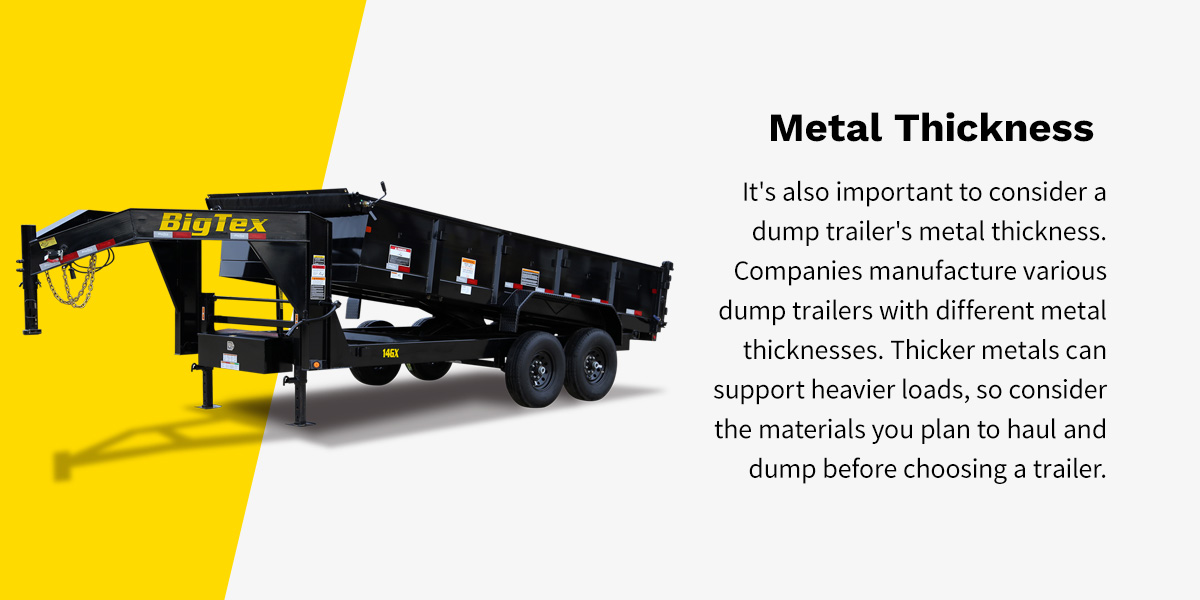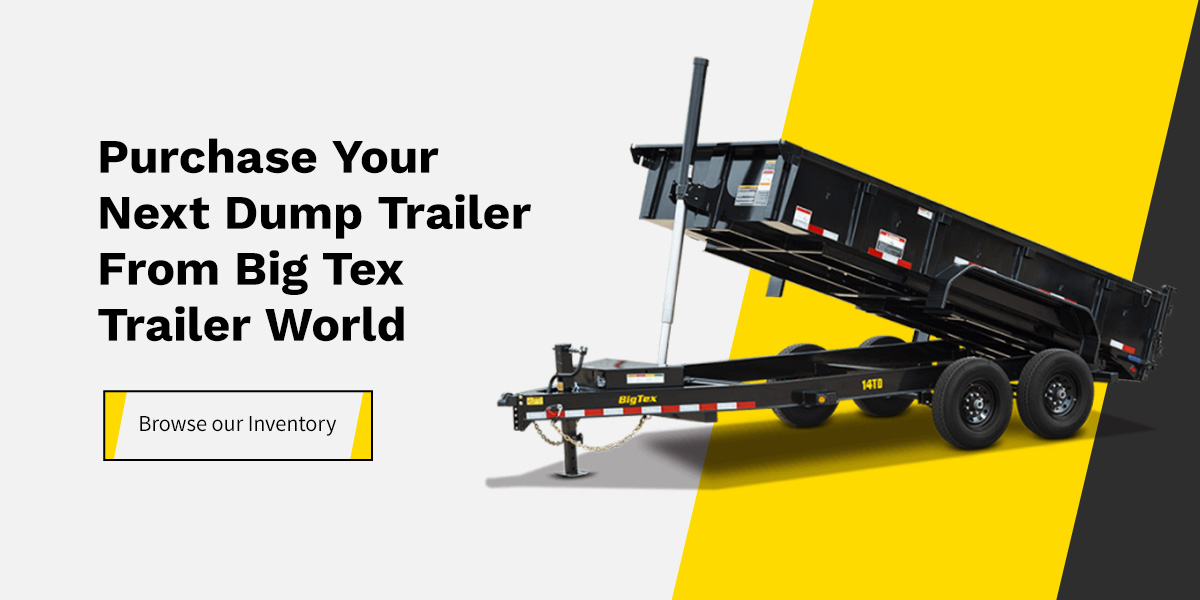Buying the right dump trailer enables you to efficiently haul and dump materials without damaging your vehicle or trailer. Understanding what to consider when buying a dump trailer makes finding a trailer that meets your needs easier. Before purchasing a trailer, you should consider its size, weight, capacity, metal thickness, hoist type, design and the materials it’s made of.
Factors to Consider When Buying a Dump Trailer
Consider the following essential factors while searching for a dump trailer:
Size
The best trailer for you depends on your hauling needs and where you plan to travel. Measure the items or materials you need to haul and choose a dump trailer that can fit each item. Next, consider which roads you will need to travel. Smaller trailers are ideal for tight spaces and narrow roads, but you can pull a larger trailer on wider roadways.
Hight is another important consideration. A standard dump trailer’s wall height is typically 24 inches, but you may need a taller wall height. You can choose to customize your dump trailer’s wall size if your cargo requires higher sides. Alternatively, you can purchase metal side extensions to increase a trailer’s wall height. Extensions are removable, so you can alternate wall heights when necessary. Lower side walls offer greater flexibility, but higher side walls can contain more loose material.
Weight and Capacity
A dump trailer’s size and capacity impact the amount of material you can haul, but you should also consider its weight in relation to your hauling vehicle’s towing limits. Your vehicle’s capacity indicates how much weight it can pull safely without sustaining damage.
A vehicle’s towing capacity depends on its class, make, model, transmission and engine. Your vehicle’s towing capacity indicates how much weight it can tow when only the driver is in the vehicle, so you must also factor the weight of other people and items in your vehicle into its tow capacity.
Each person and piece of gear inside your vehicle adds to the weight it must bear. Shifting loads can also add additional weight. A dump trailer’s weight should be lower than your vehicle’s maximum towing capacity to account for vehicle passengers, gear and shifting loads.
Consider how much material a dump trailer can haul safely and how much weight your vehicle can tow before purchasing a trailer.
Materials and Finishes
When you purchase a dump trailer, you can choose between the following materials:
- Aluminum: Aluminum resists rust and corrosion better than steel. It’s also durable, low-maintenance and light, so it’s an excellent choice if your vehicle has a lower tow capacity. You can also expect better fuel efficiency when you choose an aluminum dump trailer.
- Steel: Steel is thicker than aluminum, so it can provide slightly greater strength than aluminum. It typically has lower upfront and repair costs than aluminum.
- Galvanized steel: Galvanized steel corrodes slower than steel, so choosing a galvanized steel trailer or galvanizing your steel trailer can protect it from rust.
Metal Thickness
It’s also important to consider a dump trailer’s metal thickness. Companies manufacture various dump trailers with different metal thicknesses. Thicker metals can support heavier loads, so consider the materials you plan to haul and dump before choosing a trailer.
A trailer’s bed carries most of a load’s weight, so make sure the bed is thicker than the trailer’s walls if you will be carrying heavy materials. Since steel is thicker than aluminum, it’s usually best for hauling heavier or larger loads.
Lifting Mechanism
A dump trailer’s lifting mechanism or hoist is one of its most important components because it allows the trailer to dump materials when necessary. Inquire how much weight the lifting mechanism can handle for each dump trailer you consider. Placing too much weight on this component could cause damage, so it’s crucial to choose a dump trailer with a lifting mechanism that can handle your predicted load’s weight.
A dump trailer comes with one of the following types of hoists:
- Single ram: A single ram hoist or telescopic-style lift is the most economical option, and it is ideal for hauling and dumping light commercial loads. The single ram hoist is centered on the dump trailer’s frame. Because of its central positioning, this type of hoist typically requires less maintenance than a dual ram hoist. With this hoist, your dump trailer is less likely to require repairs for frame twisting or frame fatigue.
- Scissor hoist: Scissor hoists are the strongest option, and they offer the best lifting capabilities for heavy loads. A scissor hoist covers a larger surface area to lift dump trailer beds efficiently without placing too much pressure on one spot. This is the ideal lifting mechanism if you need to haul and dump large or uneven loads.
- Dual ram: Dual ram hoists use two hydraulic cylinders and place pressure on a trailer’s outer frames to lift and dump materials. A dump trailer can twist if the lift cylinders fall out of sync, and placing pressure on a trailer’s outer frame can cause frame fatigue. For these reasons, single ram and scissor hoists are typically the better choices.
Design
You should also consider the features you need in a dump trailer. Dump trailers can come with the following standard or additional features:
- Single or dual axles: Choose dual axles for larger, heavier loads or single axles for smaller loads.
- Ramps: A ramp can make your dump trailer easier to load. You can choose a dump trailer with a built-in ramp on the tailgate or a ramp to haul under the trailer’s bed.
- Rear or side gates: Side gates are ideal for loading pallets, and rear gates come in various styles such as single-door, barn-door, mesh, spreader and truck-bed options. Rear barn-door gates are standard on most dump trailers, and they are easy to latch and open.
- Wheels: Heavy-duty steel wheels can handle heavier loads than aluminum, but aluminum wheels are more rust-resistant than steel. Tires are another essential consideration because they must be the appropriate size for your trailer. Check to ensure the previous owner sized the tires for the trailer properly before purchasing a used trailer.
- Brakes: Electronically-controlled brakes are the most common brakes on dump trailers, but some models contain surge brakes. Some states forbid surge brakes on heavy trailers, so check the laws in each state before choosing a trailer.
Purchase Your Next Dump Trailer From Big Tex Trailer World
Finding the right dump trailer allows you to haul and dump materials efficiently. Big Text Trailer World offers a wide selection of dump trailers so you can find the one that best fits your needs. Browse our dump trailer inventory or contact us to learn more and allow one of our experienced team members to help you find the ideal dump trailer.


